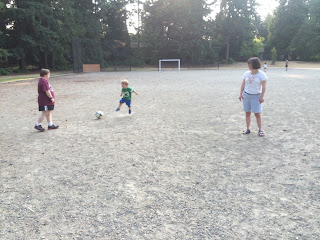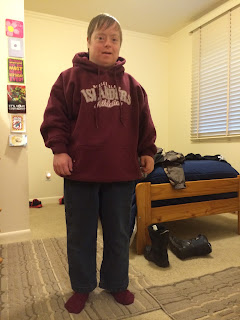It's been two years since our lives merged with the lives of two women who have complex developmental disabilities.
We began this journey with little experience with adults who have developmental disabilities; but with open hearts, willing hands, and a commitment to share life for at least two years.
Two years ago we didn't know what was going to happen when we put five people with different backgrounds, ages, abilities, and personalities together in the same house.
It's been an adventure.
In these two short years, both Sarah and Jodi have impacted us in ways that we still don't have words for, but will forever remember.
These two ladies are truly remarkable people.
They are people who live with resilience, grit, and joy in the midst of daily challenges and struggles.
Their resilience has become an inspiration for Jesse and I in the face of our own challenges. We have collectively come to depend on the routines and structured life we have built together.
In one sentence, I would sum up these two years of sharing life with Sarah and Jodi as "an amazing learning opportunity full of unexpected life lessons."
Lessons in both giving and receiving patience, grace, and love to each other and from each other. None of the five of us will ever be the same. Lives change when they are shared with people who are different from yourself.
Pictures are worth a thousand words, but there are always a thousand unspoken words behind the pictures. Although full of lessons and growth, these two years have by no means been easy. We weren't expecting easy. Honestly, we didn't know what to expect. Our time with Sarah and Jodi has been a strange mixture of joys and challenges, laughter and frustration, routines and flexibility. The first year was really unique. Full of new discoveries, new joys, and new growth.
Hearts full. Hands full.
This second year has been more defined by struggle. The novelty has worn off. Routines have set in. Grieving of losses in our personal lives. The development of dementia's rapid digression.
Hearts heavy, and hands heavy.
Dementia is no joke. Two years ago, it was apparent, but not incredibly severe for Jodi. She still had her job at the recycling center, and she still had a lot of independent skills for daily living. But dementia is an unpredictable and progressive disease with a mind of its own.
This has been a really tough year for Jodi. Her story is worth telling.
As a younger woman with Down Syndrome, she used to enjoy a lot of independence. She used to take public metro buses all over King County. She relished having this freedom and endless amounts of soda. She's always had a strong work ethic and has taken a lot of pride in having a job. One of her more prestigious jobs included working for King County Council delivering mail, but her all-time favorite was handing out programs at the Mariners games. Like most adults, she's always enjoyed seeing her bi-weekly paycheck with her name on it. Being a contributing member of society has given her a lot of strength and dignity as a person.
In recent years, she has been diagnosed with early onset dementia, and has seen a rapid decline in her ability to make wise decisions, be safe, and care for herself. This was recently accelerated by losing her job earlier this year at a recycling center where she had been employed for the past eleven years. Jodi doesn't like change, doesn't like being unemployed, and she does not like receiving care from others. Her dementia has continued to digress rapidly and she has become increasingly challenging to care for, especially in this past year.
Dementia is becoming a prevalent issue for the aging population of people with Down Syndrome. According to the National Alzheimers Organization this is what some of the early symptoms of dementia with down syndrome can look like:
In people with Down syndrome, changes in overall function, personality and behavior may be more common early signs of Alzheimer's than memory loss and forgetfulness.
Early Symptoms may include:
• Reduced interest in being sociable, conversing or expressing thoughts
• Decreased enthusiasm for usual activities
• Decline in ability to pay attention
• Sadness, fearfulness or anxiety
• Irritability, uncooperativeness or aggression
• Restlessness or sleep disturbances
• Seizures that begin in adulthood
• Changes in coordination and walking
• Increased noisiness or excitability
• (other sources also include increased anger and depression)
With the exception of seizures, and the addition of many other challenging symptoms not listed, this is what life with Jodi has come to look like this year. Her increasing need for attention and care and the challenges that come with providing her care, have been intense. Especially intense when her increasing needs are so evident to those who live with her, and yet the computerized assessment that determines her eligibility for services recognizes no need to increase her personal care hours.
People with disabilities need a small army of strong advocates in order to receive the appropriate level of care and services. Their own voices are not well heard or understood. Even with her incredible and involved step-mom, and a team of influential people advocating on Jodi's behalf for well over a year, the necessary increases to compensate for her increasing care needs were not approved. The current DSHS system in the state of Washington is grossly inadequate for the aging population of people with disabilities. For example, according to Jodi's most recent assessment, she is approved for receiving only three and a half hours of paid care per day. If you know anyone with dementia you know this is ridiculous. If you know anyone with both Down Syndrome and Dementia - you know this is absurd.
This is a big issue for our generation to be aware of. To know and consider the needs of our fellow human beings who are most often overlooked in our society.
State operated mental health institutions are thankfully becoming increasingly scarce, but what isn't as commonly known is that good housing and care alternatives are equally as scarce. Funding ongoing services for adults with disabilities is a struggle. Parents need good options for their adult kids who have disabilities, and frankly in 2015 the options are few. Adults with disabilities want to - and have equal rights to - live independently in our communities. Independence gives their lives added meaning, value, and worth. More caregivers and advocates are needed in addition to changes in legislation if real change is going to be seen in our lifetime.
I want to see this change happen. My passion is partially born out of love for my three nieces and nephews who have developmental disabilities. I want to see a different future with better options for them as they grow up. I haven't stood passively by the side-lines as Jodi has struggled this year. I've written pages of appeals, I've documented in very specific spreadsheets the amount of actual hands-on care that Jodi requires --which is three times greater than the amount she is currently approved for. I've spoken with case-mangers, supervisors, psychologists, and anyone who will listen or offer guidance. But the results always return the same: on paper she looks "healthy" and you can't change the assessment. The assessment is the tool used to define the need for services. End of story.
Sadly, this has become the end of the story for Jodi in the context of our Shared Living Home.
The weight of Jodi's complex dementia and the ongoing struggle against her assessment has become to much for us to bear in the setting of 24/7 live-in care with five people to think about. We are completing our two-year commitment with Jodi this month, and then she is moving on to hopefully find housing in a different setting with rotating caregivers.
The rest of us are staying for at least one more year. A third year with Jesse, Ruth, Caden, Sarah and a new housemate who will be joining us in December. Stay tuned for more adventures yet to come.



































No comments:
Post a Comment